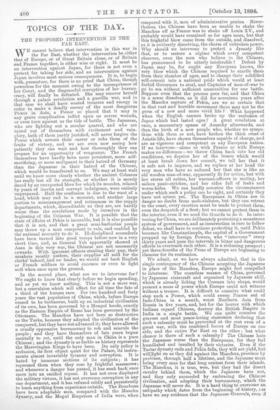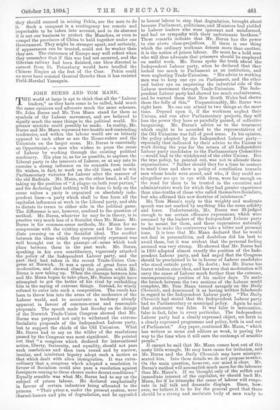TOPICS OF THE DAY.
THE PROPOSED INTERVENTION IN THE FAR EAST.
WE cannot believe that intervention in this war in the Far East, whether the intervention be either that of Europe, or of Great Britain alone, or of Britain and France together, is either wise or right. It must be an intervention against Japan, for there is not even a pretext for taking her side, and an intervention against Japan involves most serious consequences. It is, to begin with, premature, for there is no proof that China, though powerless for the moment owing to the incompetence of her Court, and the disgraceful corruption of her bureau- cracy, will finally be defeated. She may recover herself through a palace revolution and a guerilla war, and in that case we shall have wasted treasure and energy in order to make a deadly enemy of the most dangerous i Power in Asia, a Power so placed that it may in. any grave complication inflict upon us severe wounds, or even turn against us the tide of battle. The Japanese, who are fighting out a secular quarrel, and who are raised out of themselves with excitement and vain- glory, both of them partly justified, will never forgive the Power which arrests their career or robs them of the fruits of victory, and we are even now seeing how patiently they can wait and how thoroughly they can prepare for an opportunity of vengeance. The French themselves have hardly been more persistent, more self- sacrificing, or more malignant in their hatred of Germany than the Japanese in their hatred of the Chinese, which would be transferred to us. We may at least wait until we know more clearly whether the ancient Colossus has really lost all its strength, .or whether it is merely dazed by an unexpected blow for which its muscles, relaxed by years of inertia and corrupt indulgence, were entirely unprepared. Half the confusion is due to the want of a head, which may end in a moment, and another large portion to mismanagement and rottenness in the supply departments, which, discreditable as they are, are hardly worse than the revelations made by ourselves in the beginning of the Crimean War. It is possible that the state of affairs at Pekin is incurable, but it is also possible that it is not, and that a great semi-barbarian people may throw up a man competent to rule, and enabled -by the national necessity to do it. Ill-disciplined scoundrels have been turned into good troops before now in a very short time, and, as General Yeh apparently showed at Asan in this very war, the Chinese are not necessarily cowards. With ignorant officers stealing their pay, their muskets mostly useless, their supplies all sold for the clerks' behoof, and no leader, we would not back English or French soldiers to avoid excesses or even to fight well when once upon the ground.
In the second place, what are we to intervene for ? We ought to know that clearly before we begin spending, and as yet we know nothing. This is not a more war, but a convulsion which will affect for all time the fate of a third of the human race. For two hundred and forty years the vast population of China, which, before Europe ceased to be barbarous, built up an industrial civilisation of its own, has been governed by a Mongol horde, exactly as the Eastern Empire of Rome has been governed by the Ottomans. The Manchus have not been so destructive as the Turks, because they adopted the civilisation of the conquered, but they have not advanced it; they have allowed a cruelly oppressive bureaucracy to rob and misrule the people ; and they have themselves of late years begun mentally to rot, until the only man in China is a pure Chinese ; and the dynasty is as feeble as history represents the Merovingian Kings to have been. Its only policy is seclusion, its first object quiet for the Palace, its instru- ments almost invariably tyranny and corruption. It is hated by immense sections of its subjects ; it has repressed them when they rose by frightful massacres; and whenever a danger has passed, it has sunk back once more into an ossified repose. It has not even displayed the military -virtues, it has not overcome corruption in any one department, and it has refused coldly and persistently to learn anything from experience outside. The Bourbons have been adaptable men, compared with the Manchu dynasty, and the Mogul Emperors of India were, when compared with it, men of administrative genius. Never- theless, the Chinese have been as unable to shake the Manchus off as France was to shake off Louis XV., and probably would have remained so for ages more, but that this frightful blow came from the outside, and dissolved, as it is evidently dissolving, the charm of unbroken power. Why should we intervene to protect a dynasty like that, or to restore a regime which every competent observer, even the men who believe in the Chinese, has pronounced to be utterly intolerable ? Defeat by Japan may be, for aught any European knows, the very blow which the Chinese required to startle them from their slumber of ages, and to change their solidified self-conceit into a national pride which would at least forbid Governors to steal, and Captains of men-of-war to go to sea without sufficient ammunition for one battle. Suppose even that the process goes far, and that China in a sense dissolves, as it did for seventeen years after the Manchu capture of Pekin, are we so certain that in that vast and horrible movement there may not be the germ of a new and more vivid life ? What happened when the English cannon broke up the seclusion of Japan which had lasted ages ? A great revolution at once, a momentary spasm of Anarchy afterwards, and then the birth of a new people who, whether we sympa- thise with them or not, have broken the thick crust of Asiatic life, have shown themselves capable of change, and are as vigorous and competent as any European nation. If we intervene—alone or with France or with Europe makes no difference—we throw China back into her old conditions, we deprive her of the lesson which would at least break down her conceit, we tell her that it is safe not to improve, and we replace at her head the very men who have so reduced her that she is like an old wooden man-of-war, apparently fit for action, but with her stores all rotten, her warrant-officers in mutiny, her sailors panic-stricken, and her sides full of leaks and worm-holes. We can hardly conceive the circumstances under which such a policy can be right, and certainly they have not arisen yet. The Europeans in China are in danger no doubt from mob-violence, but they can retreat to the coast, every exertion must be made to protect them, even the despatch of a fleet ; but we cannot protect them in the interior, even if we send the Guards to do it. In inter- vening for China, we are deliberately protecting a monstrous system of government, and as insurrection is sure to follow defeat, we shall have to continue protecting it, until Pekin becomes like Constantinople, the capital of a Government propped up by foreign Powers, who " intervene " every thirty years and pass the intervals in bitter and dangerous efforts to overreach each other. It is a sickening prospect ; yet three-fourths of the Press of Europe are beginning to clamour for its realisation.
We admit, as we have always admitted, that in the single contingency of the Chinese accepting the Japanese in place of the Manchus, Europe might feel compelled to intervene. The countless masses of China, governed by Japanese statecraft and organised by Japanese skill, which is already licking the Coreans into shape, would present a mass of power which Europe could not witness without a tremor. It is difficult to conceive what could stop such a Power, which could sweep France out of Indo-China in a month, wrest Northern Asia from Russia in five years, and, but for the horror with which Indians regard Chinese, destroy the British Empire in India in a single battle. We can quite conceive the gravest and most peace-loving statesmen declaring that such a calamity must be prevented at the cost even of a great war, with the combined forces of Europe on one side, and the entire Far East on the other ; but what chance is there of such a calamity ? The Chinese hate the Japanese worse than the Europeans, for they feel humiliated and insulted by their victories. Even if the Tartar dynasty ends and Pekin falls, they will not yield, but willfight on as they did against the Manchus, province by province, through half a lifetime, and the Japanese must bring every man for that long contest from their islands. The Manchus, it is true, won, but they had the desert cavalry behind them, which the Japanese have not, and they only succeeded by embracing the Chinese civilisation, and adopting their bureaucracy, which the Japanese will never do. It is a hard thing to overcome an antipathy which dates from the beginning of history, tor have we any evidence that the Japanese Generals, even if they should succeed in seizing Pekin, are the men to do it. Such a conquest is a contingency too remote and i improbable to be taken into account, and in its absence it is not our business to protect the Manchus, or even to compel the provinces of China to hold together under one Government. They might be stronger apart, and certainly, if appearances can be trusted, could not be weaker than they are. The statesmen of Europe may well reflect when they remember that if this war had not occurred, and the Siberian railway had been finished, one blow directed in earnest from St. Petersburg would have levelled the Chinese Empire at the feet of the Czar. Pekin could no more have resisted General Gourko than it has resisted Field-Marshal Yamagata.



















































 Previous page
Previous page